Daughter, doctor, death broker: A MAiD provider in her mother’s last days
“She said she wanted to die… it seemed to me an irrational, impulsive wish”
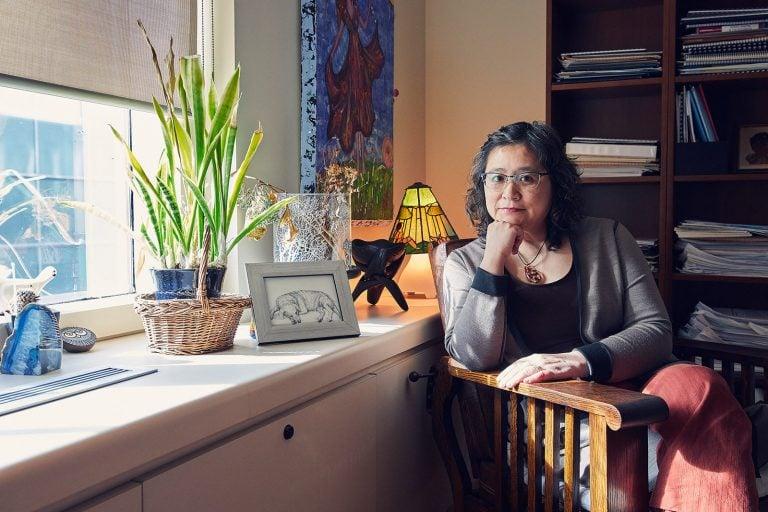
Dr Madeline Li in her Princess Margaret Hospital office, beside a framed drawing of her dog Hailey. (Photograph by Jaime Hogge)
Share
Daughter
My mother’s call woke me at 7 a.m. on a Saturday morning: “Can I come spend the weekend with you? I’ve been too weak to lift myself out of bed so I’ve just stayed in one place the last day.” At 82, despite progressive Parkinson’s disease, my mother was still living on her own, shopping and cooking for herself, and resisting my constant offers to come and live with me.
Concerned, I immediately agreed to go pick her up for the weekend. I was hoping it would give her a taste of what living with me could be like. I did not know that call was the harbinger of a three-week odyssey that would challenge me personally, professionally and philosophically, and culminate in my mother’s death.
I am a psychiatrist specializing in cancer and palliative care who has developed a clinical expertise in applying Canada’s medical assistance in dying (MAiD) law, which passed in July 2016. I have done assessments for eligibility and provided MAiD for many patients and have taught other health care professionals to do the same. I have also long known that MAiD was an issue I would have to deal with one day in my own family.
In the 15 years since my father died—with his final days spent intubated in an intensive care unit—my mother had been regularly asking for “a needle to put me out of my misery.” This had always been said half-seriously, half-joking, but was also completely consistent with her pragmatic Chinese value system. She saw no benefit in needlessly prolonging life and made it clear that she would never want to die like her husband. When she called me that morning, I was certain that if this was a serious illness, my mother might refuse treatment and ask for MAiD. I called my two brothers and sister to prepare them.
When I got to her house, my mother seemed better than I had feared. It was not weakness, but sore stomach muscles that prevented her from getting up. Her ribs were sore from an overly vigorous massage a few weeks earlier, preventing her from using her arms to help herself up. She had not eaten in a day.
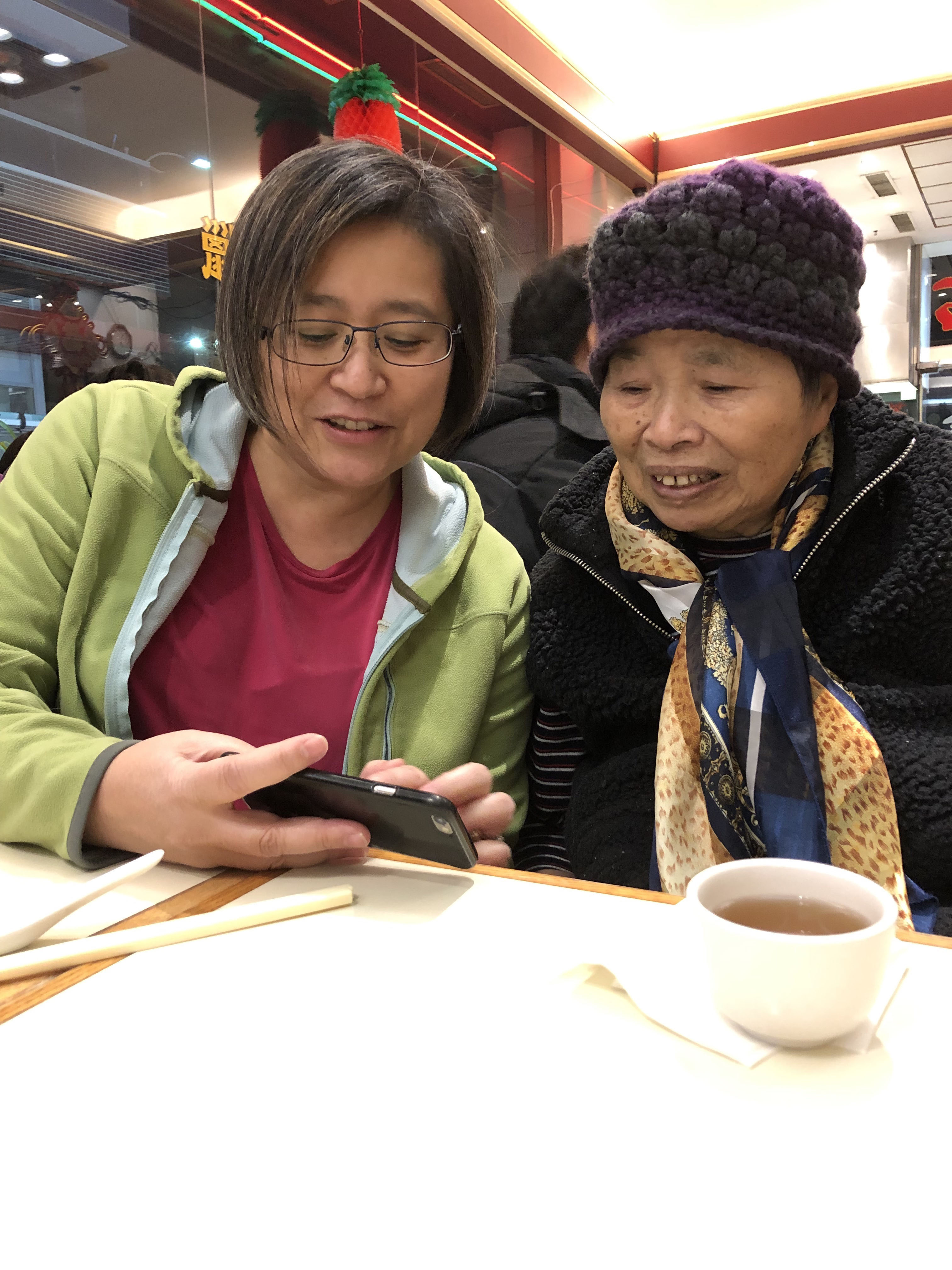
My sister joined us and we took her to a dim sum lunch before visiting her family doctor. There she received a laxative prescription and an appointment for a chest X-ray and abdominal ultrasound.
Afterwards, as my mother walked into my house, she conducted her usual inspection and rendered judgment on the inadequate contents of my refrigerator. She complained about Hailey, my 16-year-old deaf, near-blind and very arthritic Golden-Labrador cross, who was blocking her path and would not move. She complained that the dog no longer served any purpose and should have been put down long ago. I smiled at the irony of my mother’s statement for me, but I had stopped trying to explain to her that I still valued and loved Hailey, and it was not her time yet. I was used to ignoring my mother’s complaints, which I have always seen as simply being her way of expressing and tolerating distress.
Doctor
I awoke the next morning to discover my mother had been repeatedly vomiting throughout the night. She had not woken me but instead prepared some toast and Halloween chocolate for herself. I insisted on taking her to the nearest emergency department.
Scans showed she had a complete bowel obstruction of unknown cause. The doctors gave us the option of going directly to surgery or trying conservative management with nasogastric (NG) tube drainage in the hopes that the obstruction might clear on its own. As anticipated, my mother was asking to be “put down with a needle.”
Because she was exclusively Cantonese-speaking, all her communications with the doctors were filtered through me. I dutifully translated what my mother had said. The doctors responded with, “We’re not there yet.” At no point did I mention my background in MAiD, or that my mother could have qualified for MAiD on the basis of her age and pre-existing Parkinson’s disease alone. I did not remind her doctors of the requirement to make a referral for MAiD if a patient requests it. Instead, I told my mother that MAiD is a process which can take days to arrange, and that surgery may not be needed yet, but an NG tube might relieve her vomiting right away. She agreed to begin the conservative approach.
I was trying my best to be the daughter, not the doctor, but it was difficult to disconnect parts of myself, to consciously disavow my own training and knowledge. I was highly conflicted about my mother’s MAiD request. I wanted to respect her rights and wishes, but I also questioned whether she was really asking to die in that moment. Just a few months earlier, as she and I discussed the need for her to move to a retirement residence or live with one of her children, my mother again said that I should just give her a lethal injection so she would not have to be a burden. I finally jokingly offered to arrange for it immediately, and she laughed and said she was not ready, that she wanted to see her grandchildren grow more and that she still enjoyed gambling at her regular mah jong parlour every week.
So I heard her request to die that day as another of her complaints, her way of coping with suffering. I desperately wanted to protect her from making an ill-conceived request for MAiD. My siblings and I surrounded her with care, hoping to alleviate her discomfort enough that she stopped talking about dying. We arranged our schedules so that she was never alone during hospital visiting hours. I cleared my calendar of patients, and spent as much time as I could doing non-clinical work at her bedside.
For three days my mother was not allowed to eat or drink. I should emphasize the meaning of eating to the Chinese. The vernacular greeting in Cantonese is not, “How are you?” but, “Have you eaten yet?”, or more specifically, “Have you eaten rice today?” My mother complained bitterly of hunger and suggested that the doctors were trying to starve her to death. When it became clear the obstruction was not resolving, she consented to surgery. I believe she saw this as the only route to eventually being allowed to eat again. The surgeons successfully resected the area of obstruction and repaired her bowels. She was expected to fully recover.
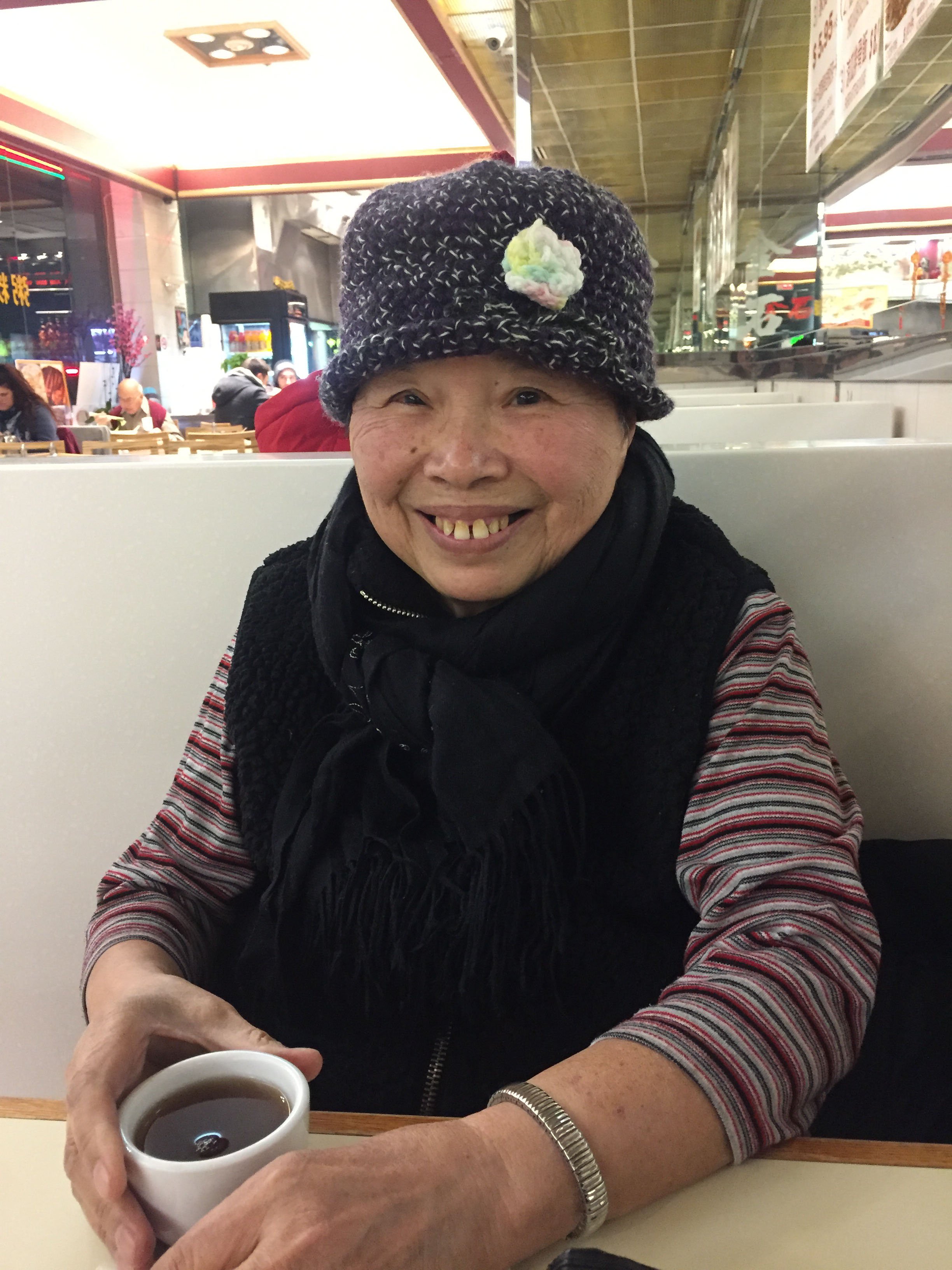
MAiD
After 10 days, my mother’s bowels finally seemed to wake up. We were able to give her ice water, juice and bone broth, and then progressed to cream soups and even some leftover Halloween chocolate. Small amounts, but that was no small reprieve from from her suffering. During this period of relative calm, as I sat working on my laptop in her hospital room, she said, “I don’t know whether to love you or be mad at you.”
“For what?”
“For bringing me here and putting me through all this. I should never have gone to your house.”
“I had to bring you to hospital. You would have died alone at home otherwise.”
“Good. That would have been best.”
I said, “You don’t have to choose. You can do both—love me and be mad at me.”
She laughed and agreed.
That’s when I understood how ambivalent she was. Just the week prior, my mother was fully engaged in and enjoying her life. After several days of vomiting, pain and starvation, she said she wanted to die. Her given reasons were that she had no hope of recovering from surgery, the road to rehabilitation would be too hard, she was suffering from endless hunger, and her condition was too much of a burden to all of us, herself included. It seemed to me an irrational, impulsive wish.
MAiD assessors typically rule out an impulsive request by looking at whether the person has been thinking about MAiD for a long time, and whether the request is consistent with their world view. They would have found both to be true of my pragmatic mother. She had been scornful, for example, of my British parents-in-law for bringing her cut flowers at their first meeting—she could not understand the value in paying good money for something that would die in just a few days. Along similar lines of reasoning, she believed that this hospitalization was the beginning of inevitable decline, as her Parkinson’s had already increasingly been making life harder. She had lived a full life, and her children were successful adults. “What’s an extra year or so, when it will eventually end anyway?” she asked.
In the same sentence, she said both that she would not want to die if she could recover and also that she accepted that it was her time. As a psychiatrist who helps patients with end-of-life suffering, I am frequently faced with having to determine whether and how much psychological suffering is influencing a person’s capacity to consent to MAiD, particularly as psychological suffering is in fact one of the MAiD eligibility criteria.
RELATED: Expanding eligibility for MAID should not be rushed
It is not especially challenging to recognize the rare cases of severe depression or psychosis which render a person incapable of understanding that MAiD will bring certain death, or cause them to irrationally evaluate for the worse what their futures would be like if they continued to live. Considerably more challenging to identify is the transient psychological suffering from medical illness that falls within the normal range of human reaction but can unduly influence judgment. Medical practitioners are trained to evaluate capacity based only on a person’s cognitive decision-making ability, but most people also make emotionally based decisions. In cases such as my mother, both rational and irrational thinking may be present at the same time, with cultural factors adding to the complexity, and it may be impossible to distinguish what is driving the desire to die.
While struggling to sort out whether my mother was emotionally capable of asking to die, I was keenly aware of the anticipated change in the Canadian MAiD law to expand eligibility to people who are not at the end of life, such as those who have mental disorders. If evaluating for the undue influence of emotion was this hard where there was a life-limiting medical illness, I could only imagine it becoming even harder in future if MAiD is permitted for chronic health conditions.
It was also a new insight for me how readily we MAiD assessors disregard concerns raised by objecting family members about a person’s capacity to request MAiD, dismissing these as being motivated by not wanting their loved ones to die. I knew that I was in no position to assess my mother’s capacity, but I truly believe that if she had made it through the acute hospitalization, I would not have questioned a future request for MAiD when her general quality of life worsened. I was just grateful that, for the time being, she had stopped asking for MAiD.
Death Broker
My mother seemed to be recovering. The NG tube was out and she was eating again. She went for walks in the hospital corridors, performed leg exercises that the physiotherapist showed her, and watched Chinese YouTube videos on the mobile device we brought in for her. Things appeared to be going well.
But as she resumed eating, she developed new abdominal pain. My brother had come to relieve my shift the evening it started. As I was about to leave her hospital room she suddenly turned to me and uncharacteristically said, “Don’t go.” I will never forget the look in her eyes. I instantly dropped my bag and called for the nurse. My mother could not speak above a whisper and became incapable of even shifting her leg in bed. She became confused and analgesic medications were withheld in an effort to prevent further confusion. Our family played recordings of Chinese flute music and massaged her. We researched acupressure points to help relieve her pain. I got to know the contours of her face as I caressed it to comfort her.
At one point, my mother looked at me and with utmost seriousness asked for an injection to die. There was no longer any hint of lightness, complaint or ambivalence in her request. She repeatedly and insistently asked me to provide it: “The sooner the better, I’m suffering too much.” I told her that I legally could not provide this but would bring it to the attention of her doctors.
I found the surgical resident. “Could you please re-assess my mother? She’s in a lot of pain and is suddenly profoundly weak.”
“We’ll get an urgent CT scan of her abdomen and see what’s happening.”
“She is now seriously saying she wants MAiD.”
The resident looked at me uncomfortably and replied, “It’s too soon to talk about that. She’s still being treated curatively.”
I said nothing.
“Death brokering” was described in 2015 by Stefan Timmermans, a sociologist at UCLA, as helping people navigate the profound challenges with choosing between the different forms of dying that medicine has now made available to them. This role has largely been assumed by doctors, although it is unclear who among a patient’s medical team—family doctor, medical specialist, palliative care physician, psychiatrist, MAiD provider—is ideally positioned to play this role. And maybe it shouldn’t be a medical person but a community member, like a religious leader, or maybe a death doula. Or is it optimally a family member? I wondered whether I had inadvertently taken on the role of my mother’s death broker, and, whether, in that role, I should have been more active in helping her die the way she wanted to.
RELATED: The doctor who took on death
The abdominal CT showed rupture of the sutured intestines and new obstructing adhesions. The surgeon spoke to me and my siblings. The options now were to undergo a high-risk emergency surgery repairing the leak or to palliate and consider MAiD. If my mother opted for surgery and survived, the recovery would be long—on the order of many, many months of rehabilitation—and there was a good chance she would never return to her previous level of function.
This time we requested the involvement of a professional Cantonese interpreter. The issue of MAiD was not raised—not by my mother nor by the attending physician. Given the opportunity to directly request MAiD of her doctors, my mother did not. There was a detailed discussion of the risk of dying from the proposed operation; there was not a detailed discussion of the risks associated with surviving.
My mother surprised me by choosing the surgery. Some of my siblings believed her decision reflected her underlying resilience and will to live; others believed her when she said that she hoped not to survive the surgery. I fell into the latter camp. I also knew that if she found life intolerable after the surgery, we could revisit MAiD.
My mother prepared herself to die. She expressed appreciation that we had all gathered. We brought in grandchildren through social media devices and she dispensed loving wishes for their futures. She tasked my older brother, as the first-born male, with taking care of the rest of us. She reciprocated when we each said we loved her. Then we returned to the ICU waiting room.
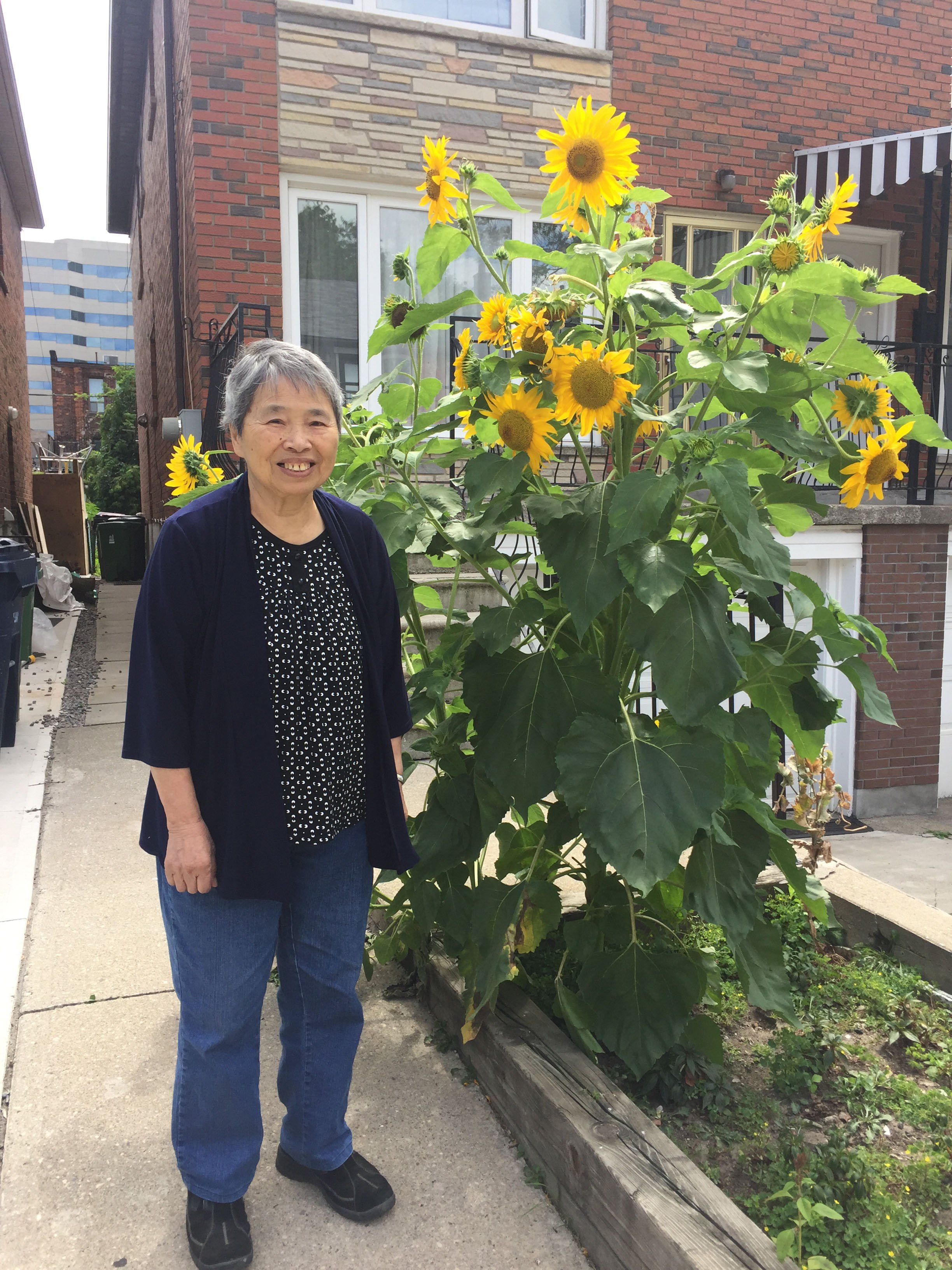
November 11, 2019
6 a.m. The surgeon came out to tell us that my mother’s tissues were in very bad condition. The surgical team had repaired things as best they could with an ileostomy bag and several drainage tubes, but the prognosis was very guarded. My brother asked if there was a chance the ileostomy could be reversed. The surgeon moved back her chair back to be sure we could see her clearly. She looked at us very intently. “I need to be sure you understand what I’m saying. Your mother is not likely ever to walk out of the hospital. The ileostomy isn’t the focus now.” We all visited our mother briefly in the ICU, intubated and unconscious. Then we went home.
10 a.m. Unable to sleep, I returned to the ICU to resume my watch. My mother’s condition was unstable. They needed to medically manage her heart rate and blood pressure. She was not producing urine, which suggested her kidneys were not working. She was in septic shock and about to undergo multi-system organ failure. It was exactly the situation my father had been in when he died, intubated in an ICU, kidneys shut down, exactly the type of death my mother had adamantly maintained she did not want.
2 p.m. The ICU doctor pulled me aside for a goals-of-care conversation. He was careful not to use the word “futile.” “We’re very good at keeping patients alive here,” he said. “We’re not so good at getting them better.” He was clear that my mother could die at any time from a stroke or a heart attack or a metabolic problem. If we did not want her to die like my father did, he said we could withdraw life support. My mother’s words echoed in my head: “The sooner, the better.”
3 p.m. I calmly called everyone to come back to the hospital. When I heard my husband’s voice on the phone, I suddenly could not speak. Until that moment, it had not occurred to me that my mother would actually die. As the realization of what we were about to do sank in, standing alone in an alcove by the elevators, I started to convulsively cry. I was astonished by the intensity of my feelings.
9 p.m. The family gathered. I explained what I could of the medical situation. Despite my training, despite my experience with my father in the past, it was not until that moment, standing next to my mother’s bedside, that the meaning of keeping someone on life support really became clear. It was an epiphany to realize that her natural death had already occurred. Putting someone on life support is the opposite of MAiD.
11 p.m. We each took private time to say goodbye. Then we surrounded her bed as a group. Monitors were turned off. I asked to remove the NG tube and to clear her face of medical equipment. She drew not a single breath on her own after she was extubated. I caressed her face one last time, for my own comfort, and gave her cheek a kiss. Death was declared at 11:11 pm.
Grief
I suppose no one but me was surprised by how much I grieved in the following days. I thought I had reconciled myself to her death—she had been accepting of it for years. She welcomed it over the loss of independence or the possibility of dying from a more protracted illness. I have seen a lot of people die; I haven’t often seen people face death like my mother did—head on, unflinching, winning by not entering into the fight, winning by making death her ally.
My mother was the family matriarch, and her funeral was full of tears, stories and Chinese ritual. The room was filled with glorious bouquets of flowers, their scent wafting down the hallway. At the viewing, I expressed guilt to some of my guests about the Chinese tradition of accepting flowers instead of donations to a charity. This struck me as inconsistent with my mother’s attitude toward flowers.
Three days after the funeral, our burial traditions require us to return to the cemetery, to place still more fresh flowers on the grave. It was a cold and wet day in late November, and the original mound of flowers had already wilted and fallen apart.
I realized then that the way their beauty so quickly fades and returns to the earth is powerfully symbolic of life and the body itself. There was something comforting in the almost mystical timing of my mother’s death—11:11 p.m. on November 11— and in the flowers’ reminder of the expected impermanence of life.

Grief comes in waves, the classic pangs of grief. I know it will take time, but it is a timeless moment. I have been struck by how many of my emotional moments come on abruptly, seemingly disconnected from thoughts of my mother, as if my grief is an autonomous process. Perhaps the loss of a mother is one we are evolutionarily programmed for. John Bowlby first described parent-child attachment as an ethological safety regulating system, evolved to ensure proximity of helpless infants to their attachment figures during times of danger. In other words, we evolved to attach to our mothers. When we lose them, grief may be a manifestation of the unravelling of our attachment system. That is what it has felt like to me. My brain is autonomously rewiring.
Might be simpler to call it love. Because I prefer to believe that while the attachment system may rewire and grief will end or at least subside, love will endure. I saw that this week looking in the mirror. For the first time I saw the contours of my mother’s face in my own. I had never noticed the resemblance before.
I sometimes regret that my mother did not in the end receive MAiD. I find myself missing the poignant moment where you can say goodbye with conscious certainty. Our last words were a quick “I love you” as she was wheeled into the operating room, spoken with the uncertain hope that we would see each other again. As I try to make sense of what happened, I wonder if we, her children, had been like adhesions, holding her down?
I have spoken to many of the spouses and children of people who request MAiD. Few have voiced what I experienced—that my mother’s MAiD request felt like a failure of love. Could I not love her enough, and did she not love me enough, to make life worth living?
In truth, the complex dynamics of MAiD among families are reciprocal cycles of selfishness and love, filtered through different lenses. For the patient wanting MAiD, there is their own suffering and the wish to spare loved ones of burden; for a family member, a MAiD request might feel like selfishness and a rejection of love. For the family member, there is the wish to provide caregiving and to have every last moment, but for the patient this wish might seem like selfish and misattuned love. There is a mutual pathological altruism at play, born out of loving each other too much.
This week, my dog Hailey’s function has taken a step down. She can no longer get to her food dish in the morning. Her hind legs keep giving out on her and she falls over with every attempt to stand. I took her to the vet and came home with a canine mobility harness and a copy of the HHHHMM Quality of Life Scale. A 0-70 point questionnaire where a score below 35 suggests it’s time to consider euthanasia. At the very least, what I have learned these last three weeks will help me work through Hailey’s end game. My mother would be pleased.
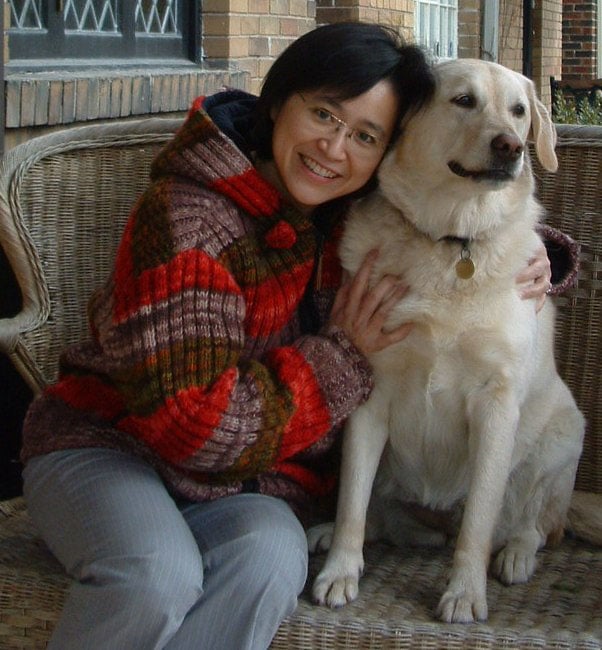
Madeline Li is a cancer psychiatrist working in end-of-life care. She developed the medical assistance in dying program for the University Health Network in Toronto.